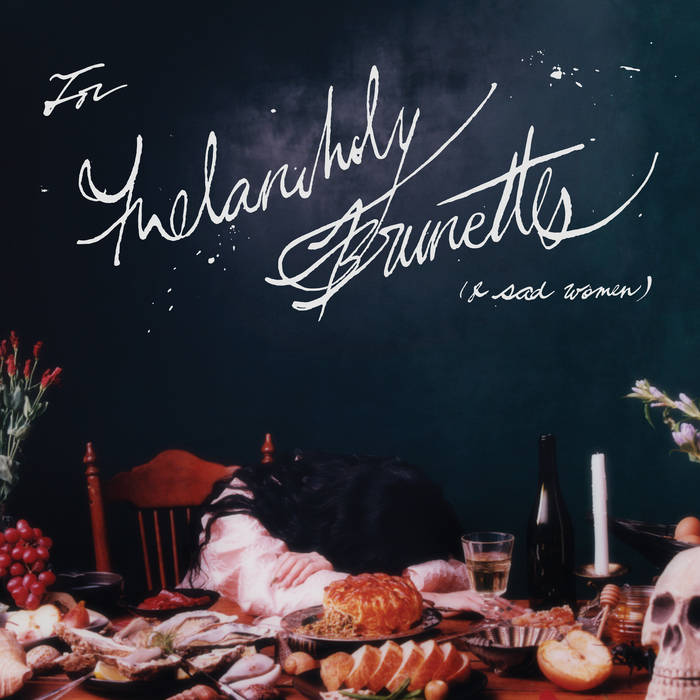Ishita Jayadev ’26
Editor-In-Chief
When I first listened to the new Japanese Breakfast album, For Melancholy Brunettes (& sad women), while lying in my childhood bed — with my phone playing the music quietly on speaker on top of the pillow next to me — hearing the lightly plucked strings on the opening track and Michelle Zauner’s soft vocals, gave me an overwhelming sense of relief.
I hadn’t been scared, per se, that I wouldn’t like the album, but as one of the biggest fans of Jubilee ever, I wasn’t sure if the new album would live up to the hype I had created in my own head. However, the production and orchestral instrumentals on the more mellow and somber tracks felt like a natural progression from the grandiose delight of Jubilee and reminded me a lot of their earlier albums.
The ten tracks that make up the album span a short 32 minutes; I found myself surprised that I had gotten through over half the album before falling asleep. While the album retells myths and stories by taking on the perspectives of others, such as the tracks “Orlando in Love,” based off of Virginia Woolf’s book, Orlando, “Leda” which plays on the Greek myth of Leda and the swan, or “Little Girl” written from the perspective of a father about a daughter, the album uses Zauner’s anxiety as a door into the deep sadness she reflects upon in her lyrics.
I will admit that I am one of those people who listens to songs primarily based off of vibes and only starts processing lyrics on my 50th listen, so apologies in advance for some hasty analysis — I’m only about 15 listens in so far.
“Here is someone,” immediately sucked me into the sonic world of the album with its soft cymbals and flute, while also establishing some of the album’s main themes, as the narrator seems to reflect on wanting a slower and calmer life. Narratively, this made sense to me as the album opener after the bombastic upbeat Jubilee, as the narrator seems to be coming to terms with her melancholy nature.
“Life is sad but here is someone,” Zauner sings. It is clear that even within this album of yearning and melancholy, there is still hope, reflected here in the love she has for her partner.
People often make the mistake of assuming songs are about romantic love and I found myself falling into the same trap, thinking the soft lullaby-like “Leda” on the new album as well as “Tactics” from Jubilee were about a long-distance relationship. When I found out (albeit on Genius lyrics) that both were about her father, the opening lyrics made sense in a sweet new way — “Tell me everything” being what her father answered the phone with, even after the two weren’t in contact for an extended period of time, made me feel hope for my own complicated relationships with family.
Zauner talked about this memory to NPR saying, “Even though your relationship with your family can become quite complicated and painful, many years can pass and you can say something so casual like ‘Tell me everything.’”
There’s also something beautiful about her embodying her father’s words as Zauner’s voice on the opening lines sound almost uncertain as the melody pitches upward.
Despite my mistaken assumptions, “Leda” remains one of my favorite tracks of the album. Zauner writes yearning like no other: “Talking to you/It’s nearly morning where you are/While my afternoons move so slow/Pacing the room/Awaiting a moment gone too far/And your special way of ruining the mood.”
As a friend said to me in a text, “‘Leda’ is about a drunk dad but also about my long distance relationship.”
Another song off of Jubilee I was reminded of when looking at the lyrics of “Leda” was “Paprika,” the opening track of the album as both songs have similar sounding lines about unraveling knots — with varying success.
“Paprika” has the line, “I awoke from dreams of untying a great knot/It unraveled like a braid into what seemed were thousands/Of separate strands of fishing line/Attached to coarse behavior, it flowed” while “Leda” has the lyric, “Gordian-like knot/Raveled by the days/Tried to cut you off/Somehow pulled it tighter.”
While I’m not sure if these two songs were intentionally paired, the lines felt too similar to ignore. In any case, “Leda” plays like a matured sequel of a song, showing Zauner experiencing the futility of trying to break blood ties and coming to a measured acceptance of how they continue to affect her through her writing of the phone call with her father.
“Picture Window” was another one of my favorites off the album. Zauner’s bright croon over upbeat drums singing about her partner’s laissez-faire approach to life versus her own fear of all her loved ones dying (put together in a certified bop) felt appropriately in tune with the album’s broader themes.
As a SoCal transplant, I also enjoyed “Winter in LA.” Zauner’s riff on the lyric “She loves the sun” was the immediate vocal highlight of the album for me, combined with the descending string scales and warm piano of the track, it felt like the perfect melancholy but comforting Christmas song — my favorite niche winter music genre.
The first “she loves” riff blooms into the chorus and rest of the song, as Zauner goes from singing about the narrator wishing she could be a happier partner to her lover, to fantasizing about this hypothetical happy woman. “She loves the sun/And California days/Sweet and warm/Like winter in LA,” Zauner sings on the second chorus, wishing for happiness even while accustomed to her sorrowful nature.
All in all, For Melancholy Brunettes was a lovely listen for me — for anyone else looking to give it a try, I would most recommend pairing it with the ambiance of springtime rain or late at night in bed while coming to terms with your own melancholy.



